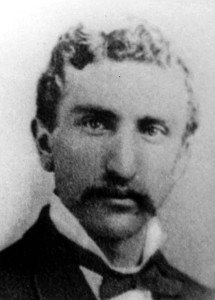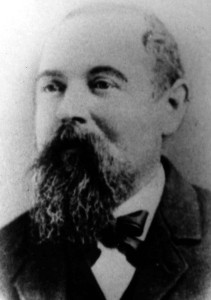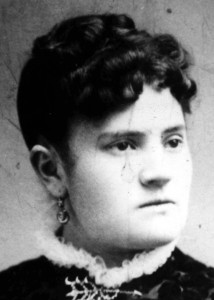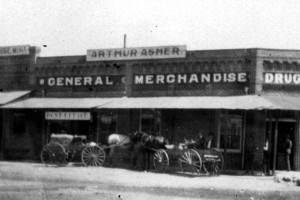Early Interconnected Kern County Pioneer Jews
Values Codes I – E – L – P
The Hirshfeld Brothers
Lesser Hirshfeld was one of four pioneer merchants who came from Germany to America.
He was known as “Cristobol” because of his friendly relationships with local Hispanics.
In 1872, he was the first store keeper – along with Morris Jacoby – in the Panama Settlement, located eight miles southwest of Bakersfield.
“One day a Mexican friend stopped at the store and invited Hirshfeld, or ‘Cristobol,’ as he was known by his patrons, to come with him to a dance at a road house a few miles down the road. Business was dull, and a part of the science of mercantile success is to maintain friendly relations with one’s patrons, so Cristobol saddled his horse. Arriving at the dance, the merchant was impressed by the presence of a large number of strangers and a display of fire arms unusual even for a dance in the early days, and he was not long in deciding the character of his fellow guests. Hirshfeld took a perfunctory part in the festivities and did the proper thing by treating everyone including the outlaws to drinks and cigars, and then making some excuse about a business engagement, he took a circuitous route back to his store, gathered up his cash and galloped by another round-about way to town. He came back next day expecting to find his place robbed, but nothing had happened. This was Thursday, and that night the pioneer merchant again galloped to town with his day’s receipts. The same process was repeated Friday and Saturday, and Hirshfeld had about exhausted his ingenuity in inventing reasons to give his clerk for passing the nights in town, but when he got home Sunday morning there was no need for further explanation. In the night, Tiburcio Vasquez [A famous California bandit, later captured by Emile Harris, the first Jewish sheriff of Los Angeles] and his men appeared masked and held a parley in front of the store with some of Hirshfeld’s neighbors. It developed later that the neighbors convinced the outlaws that Hirshfeld had gone to town and taken all his money with him. Thereupon the gang threw oflf the masks, entered the store, called for drinks and paid for them; called for another round and did not pay; called for a third round and paid, and disappeared on their horses in the darkness. Any discerning person will understand that Vasquez, with the courtesy for which he was noted, did the proper honors of the time and the occasion just as though the proprietor had been present, and the proprietor, when he returned, fully appreciated it.”
— A History of Kern County, by Wallace Melvin Morgan
Herman Hirshfeld went into business in Havilah, the new Kern County county seat during the boom gold mining years of the 1860’s.
Herman started working for Morris Jacoby and eventually became a partner.
In 1869, Herman operated a branch of the Havilah business in Bakersfield with Morris Jacoby.
In 1868, Havilah Lodge, #148, of the Independent Order of Odd Fellows was organized. Herman Hirshfeld was vice grandmaster.
In 1872, the Kern Lodge, #202, Independent Order of Odd Fellows was organized in Bakersfield. Herman was noble grandmaster.
Herman Hirshfeld was listed on the Kern County Board of Supervisors in 1880.
Marcus Hirshfeld arrived in Tehachapi in 1874.
He purchased Ed Green’s general mercantile business.
In the 1870’s, Marcus also operated a store in Old Town (Williamsburg), three miles west of Tehachapi.
In 1877, Marcus was named Postmaster of Old Town.
1881, he sold his interest to Isador Asher and went north to Bakersfield to join his brother, Dave.
Marcus Hirschfeld married Minna Asher.
Dave Hirshfeld
In 1871, Dave Hirshfeld worked in Santa Ana, California.
He placer (surface) mined in Baja California in 1872.
In 1874, he joined his brothers in Bakersfield at Hirshfeld Brothers & Co.
“Dave Hirshfeld occupies an enviable position as a business man in Kern valley, and his success is due mainly to that sterling trait of character — that he never misrepresents anything in business. Mr. Hirshfeld takes a lively interest in home affairs which tend to forward the material interests and development of his town and vicinity, and as a citizen and social companion is highly regarded.”
— Pen Pictures of the Garden of the World: Memorial & Biographical History of the Counties of Fresno, Tulare, and Kern, California (Lewis Publishing)
In 1889, Hirshfeld Bros. & Co. was bought out by Emile and L.M. Dinkelspiel of San Francisco.
Morris Jacoby
Morris Jacoby was born in Prussia.
He became an American citizen in 1868
M. Jacoby and Co. was one of the first Jewish merchandising firms in Kern County.
“The company sold wool, hides and grain in Havilah. In 1869, with Herman Hirshfeld, J. Cohn, and E. Cohn, Morris Jacoby opened a branch of the Havilah business in Bakersfield. M. Jacoby & Co. takes pleasure in announcing to the people of Kern River Island that they have opened a Variety Store at Bakersfield, and begin to solicit a share of patronage. Their stock comprises:
“Dry Goods * Groceries * Clothing * Boots and Shoes
“Provisions * Hats and Caps * Hardware
— Havilah Courier, August 24, 1869
In 1872, with Levy, together with Lesser Hirshfeld, opened branch in town of Panama.
Morris Jacoby served as a member of Bakersfield’s first Board of Trustees.
In 1869, he was elected first corresponding secretary of the International Order of Odd Fellows #148 in Havilah.
In 1872, the Kern Lodge, #202, Independent Order of Odd Fellows was organized in Bakersfield with Morris Jacoby as recording tecretary.
In 1883, Jacoby took part in an “incident”:
“In October,1883, Morris Jacoby and two companions transported some gold bullion belonging to the Big Blue mine by wagon to the Southern Pacific rail stop at Caliente. While on the road, they were stopped by two armed and masked bandits who demanded their cargo. Jacoby advised the outlaws that the gold they demanded had been shipped the week before in another conveyance. The would-be bandits believed Jacoby and disappeared into the nearby brush. The masks did not keep Jacoby from identifying the bandits as James and Fletcher Burton. He accompanied Kern County Sheriff, William Bower, into the Kern River country to arrest the brothers. Jacoby and Bower were successful, placing James and Fletcher Burton in the Kern County jail in Bakersfield on charges of attempted robbery.”
— Wild West Magazine, October 2006
Otto Belau
Otto Belau, with Dave Hirshfeldm, sold a business to the Hochheimer Brothers in September 1900.
That business eventually became Brock’s Department Store, and later, Gottschalk’s Department Store.
Sam Blum
Sam Blum owned a mercantile business and bank in Cordova, Alaska.
Blum married Bertha Hochheimer.
Malcolm Brock
Malcolm Brock was born in 1878 to Julian Brock and Mattie Hochheimer Brock, owners of Cohn & Brock, a retail clothing store in San Francisco.
For his first full time job in 1894, Malcolm Brock worked for his uncles Moses and Amiel Hochheimer in Willows.
In 1906, Malcolm went to San Francisco to look into construction possibilities after the Earthquake-Fire.
From 1909 to 1922, he worked in Cordova, Alaska, managing his uncle Sam Blum’s Blum, O’Neill General Merchandise Company and First Bank of Cordova. He became a partner and, eventually, president.
Malcolm returned to Bakersfield to help reorganize troubled family business during a serious recession.
He finally bought Hochheimers’ with approval of creditors, and renamed the store Brock’s.
Ira Hochheimer
Ira Hochheimer was the oldest son of Amiel and Bertha Hochheimer.
In 1898, he graduated from the University of California.
Ira then returned to Willows to work in family business.
Monroe Hochheimer
Monroe Hochheimer was the second son of Amiel and Bertha Hochheimer.
In 1908, he, too, joined the family business.
Jacob Asher (Auscher)
Jacob Asher was the first prominent Jewish resident of Kern County.
In 1850, in the mining boom town of Havila, Jacob Asher owned a “Two-tabled Billiard Salon” with a Mr. Sanderson.
In 1867, Asher and Sanderson’s establishment was the polling place in the first Kern County election.
Jacob Asher was elected Kern County Coroner in 1871.
Jacob Asher married Rose. Albert Asher, born later that year, was probably the first Jew born in Kern County.
Charles Asher (Auscher)
Charles Asher was born in Poland and brought up in Prussia.
He had two brothers, Arthur and Isador.
Charles Asher came to New York City, where he married Anna Marx.
The Ashers came West to settle in Ransburg, California, now a ghost town northeast of Mojave on US395.
Charles Asher moved to Tehachapi around 1896, where his uncle was established. Anna had relatives in Kern County.
Asher Brothers had stores in Tehachapi, Mojave, Taft, Randsburg, and Lancaster.
Charles Asher was the largest single shareholder in the Yellow Aster Mine, the richest mine at the time in California.
Charles donated $250 towards construction of the Tehachapi community church.
He also served on the cemetery board, although it did not have a consecrated Jewish section.
Charles and Anna had two sons and a daughter: J. Leslie, Albert (aka Alden Nash, screenwriter), and Ruth.
Charles Asher is buried in the Home of Peace Cemetery in Los Angeles.
Elias Cohn
In 1869, Elias Cohn merged his business with M. Jacoby & Co. to form Cohn, Jacoby & Co. at Havilah, Bakersfield, and Tehachapi.
The partnership included M. Jacoby, H. Hirshfeld, J. Cohn, and E. Cohn.
The company reorganized when Jacob Cohn left the partnership in 187o.
Elias Cohn was the noble grandmaster when Havilah Lodge, #148, of the Independent Order of Odd Fellows was organized in 1868.
Sources
- Shirley Ann Newman, We Brought Sinai to San Joaquin, The Story of the Jews of Kern County (Bakersfield: Temple Beth El, 1998).
- Annie R., Mitchell, “Pioneer Merchants of Tulare County, California,” Western States Jewish History 2/3.
- “Jewish Businessmen of the Counties of Fresno, Tulare & Kern Counties,” from Memorial and Biographical History of the Counties of Fresno, Tulare & Kern, California (1891), reprinted in Western States Jewish History 34/4.
Regina Merwin is curator of this Kern County Pioneer exhibit.



